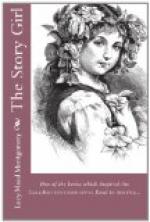“What—what—was IT like?” whispered Felix, curiosity getting the better of his terror.
“IT was tall, and black, and hairy,” said the Story Girl, her eyes glowing with uncanny intensity in the red glare of the fires, “and IT lifted one great, hairy hand, with claws on the end of it, and clapped William Cowan, first on one shoulder and then on the other, and said, ‘Good sport to you, brother.’ William Cowan gave a horrible scream and fell on his face right there in the wood. Some of the men around the church door heard the scream, and they rushed down to the wood. They saw nothing but William Cowan, lying like a dead man on the path. They took him up and carried him home; and when they undressed him to put him to bed, there, on each shoulder, was the mark of a big hand, BURNED INTO THE FLESH. It was weeks before the burns healed, and the scars never went away. Always, as long as William Cowan lived, he carried on his shoulders the prints of the devil’s hand.”
I really do not know how we should ever have got home, had we been left to our own devices. We were cold with fright. How could we turn our backs on the eerie spruce wood, out of which SOMETHING might pop at any moment? How cross those long, shadowy fields between us and our rooftree? How venture through the darkly mysterious bracken hollow?
Fortunately, Uncle Alec came along at this crisis and said he thought we’d better come home now, since the fires were nearly out. We slid down from the fence and started, taking care to keep close together and in front of Uncle Alec.
“I don’t believe a word of that yarn,” said Dan, trying to speak with his usual incredulity.
“I don’t see how you can help believing it,” said Cecily. “It isn’t as if it was something we’d read of, or that happened far away. It happened just down at Markdale, and I’ve seen that very spruce wood myself.”
“Oh, I suppose William Cowan got a fright of some kind,” conceded Dan, “but I don’t believe he saw the devil.”
“Old Mr. Morrison at Lower Markdale was one of the men who undressed him, and he remembers seeing the marks,” said the Story Girl triumphantly.
“How did William Cowan behave afterwards?” I asked.
“He was a changed man,” said the Story Girl solemnly. “Too much changed. He never was known to laugh again, or even smile. He became a very religious man, which was a good thing, but he was dreadfully gloomy and thought everything pleasant sinful. He wouldn’t even eat any more than was actually necessary to keep him alive. Uncle Roger says that if he had been a Roman Catholic he would have become a monk, but, as he was a Presbyterian, all he could do was to turn into a crank.”
“Yes, but your Uncle Roger was never clapped on the shoulder and called brother by the devil,” said Peter. “If he had, he mightn’t have been so precious jolly afterwards himself.”
“I do wish to goodness,” said Felicity in exasperation, “that you’d stop talking of the—the—of such subjects in the dark. I’m so scared now that I keep thinking father’s steps behind us are SOMETHING’S. Just think, my own father!”




